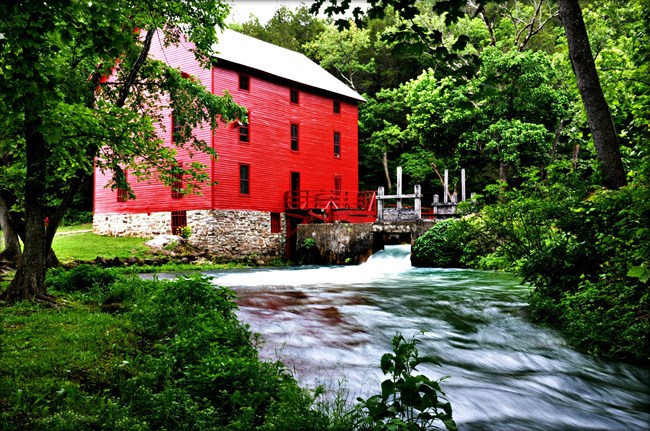|
"An unspoiled river is a very rare thing in this Nation today. Their flow and vitality have been harnessed by dams and too often they have been turned into open sewers by communities and by industries. It makes us all very fearful that all rivers will go this way unless somebody acts now to try to balance our river development." - (President Lyndon Johnson's remarks on signing the Wild & Scenic Rivers Act, October 2, 1968)

Photo by Patty Wheatley-Bishop (Alley Mill is located six miles west of Eminence, Mo on State Route 106) Grand Setting... Alley Springby Cindy Von Halle The Alley Community... A Gathering PlaceAlley was home, farm, and school for people who lived here a century ago. Dances, baseball games, and roller skating were all part of Alley’s busier days. John Knotts purchased the 80 acre site in 1902 and diversified the enterprises to include a well-stocked store and blacksmith shop. A mill was vital to community life, where grain was ground to provide the daily bread. The present building was constructed during 1893-1894 by George Washington McCaskill as a merchant mill. It was larger than most mills in the Jacks Fork area and replaced an earlier mill on this same site that was built by 1868. Originally unpainted, it was first painted white with green trim, then later the famous red color associated with Alley Mill today.FROM WHEAT TO FLOUR.....The process of converting wheat into flour was lengthy and time-consuming. The farmer brought his grain, either wheat or corn, to the miller who made an agreement to either buy the grain or make a trade. Often he would take a “toll” or percentage of the grain in exchange for grinding. Since the water supply of Alley Spring was constant, it seemed to be an ideal place for a mill. Free water power provided energy for the machines; however, recurring floods made the operation only marginally successful. The Alley roller mill was designed to process wheat flour in an area where corn was the main crop. This marketing error presented another setback for mill owners.A TOUR OF THE MILLThe Back PorchLocated under the back porch is the turbine pit. In it sat a thirty five inch Leffel turbine. Belts from the turbine brought power into the basement. A control wheel on the porch allowed the miller to control how much water entered the turbine and thereby control its speed. This ability to control the speed was one of the innovations that made turbines preferable to the old water wheels. BasementThis is where all power was transmitted to the machinery. Elevators and belts operated from a driveshaft running the length of the building. This section of the mill is not open for public visits. First FloorWhole grain (corn or wheat) entered the mill here. The grain was put into bins, then elevated to chutes that were connected to milling machines. These are the large iron and wood machines near the back of the room. Here the grain was ground, picked up in another elevator, taken back up and dropped down into the next machine. This process allowed the grain to be ground repeatedly to a fine flour suitable for baking. Bins for storage were also located on this floor, as well as the miller's office. Second FloorSifting was the main activity here. The large cube shaped machine was called a swing sifter. It shook the ground grain through a series of sieves to achieve a uniform consistency. The rectangular machines were an earlier way to do the same thing. In these machines, flour was filtered or sifted through silk. The AtticBelts that operated the second floor machines were located here. The attic is not restored and is not open for public visits. Alley Mill is an example of over 100 historic structures found within Ozark National Riverways. By protecting this landmark, we are preserving the heritage of all Americans. Please help by respecting all historic and archeological artifacts in the park. It is illegal to remove artifacts, including arrowheads, from Park Service or other Federal lands. It is also disrespectful to the memories of those who went before us. Please leave them for the next person to enjoy.
|
Last updated: October 12, 2023
